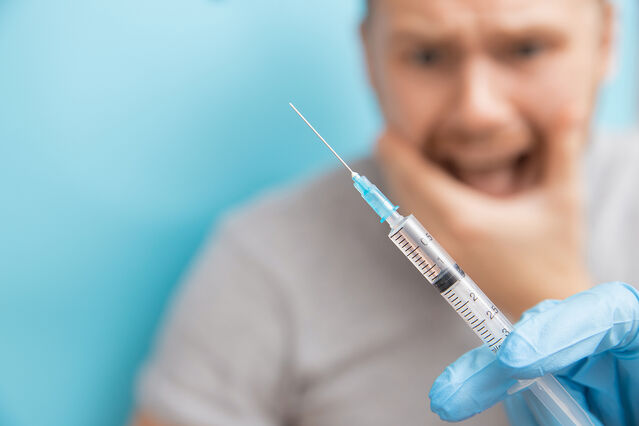Fear
Decreasing Fear, Increasing Vaccination
Simple steps to overcome the fear of needles to get optimal medical care.
Posted October 1, 2020

As a nurse, one of the most ubiquitous things I hear is, “Oh, I hate needles!” This is a very common fear for most people. In its severe form, the fear of needles is called trypanophobia. Experts say it is likely genetic, as we would instinctually fear things that would pierce our flesh, injuring us. Immunizations, tuberculosis (TB) skin tests, intravenous lines (IVs), and blood draws all cause discomfort and reinforce that fear.
Just thinking about dealing with needles can trigger a reaction that's more serious than the momentary discomfort. Severe needle phobia can induce anxiety so extreme that it can cause dizziness, nausea, chest pain, and a racing pulse. Overall, this fear can keep people from getting important vaccines or going to the doctor at all. One study found that, for example, avoidance of influenza vaccination because of needle fear occurred in 16% of adult patients, 27% of all hospital employees, 18% of workers in long term care facilities, and 8% of healthcare workers in hospitals. However, studies do show that fear of needles decreases with age.
Throughout life, there are many health conditions that may require injections or other needle access. Some include asthma, allergies, cancer, immunizations, blood donations, IV treatments, and healthcare testing. During this pandemic, some COVID-19 testing may require needles for blood draws.
Since the use of needles in providing healthcare will be a necessity during life (specifically during this unprecedented time we live in), it is important for providers to consider non-invasive alternatives when possible and offer patients coping strategies that help alleviate fear of needles.
- Concentrate on the Benefit: Remind yourself or the patient that a needle is painful for only a second, but the benefit of the injection could save you and those you love from illness.
- Distraction: Create a discussion about something that distracts or engages you (e.g., taking a dream trip or attending a birthday).
- Practice Mindfulness: Mindfully eating a raisin or piece of candy during the procedure can instill feelings of peace and calm.
- Deep Breathing: Practice deep breathing. Visualize yourself being in a comfortable/safe place.
- Be Upfront About Fears: If you are prone to hyperventilating or feeling light-headed during a needle stick, then you should ask the provider to sit or lie down during the procedure.
- Treat Pain: Ask for or use a topical anesthetic cream, such as lidocaine and prilocaine (EMLA), to help ease the initial discomfort.
- Medicate Anxiety: For more severe anxiety, talk to your doctor about prescribing a low dose, short-acting, benzodiazepine or another anxiolytic medication.
As we face a year when we will be coping not only with influenza but also COVID-19, avoiding a “twindemic” effect is vital to keeping people safe. One way to help prevent this is by getting a flu vaccination. Facing the fear of needles may be difficult, but it can help improve individual and global health.
Dee G. Henderson, BA, BA, MSN, RN-BC is the Infection Control Coordinator at The Menninger Clinic, Houston, TX. Dee received her MSN from The University of Texas at Austin where she did advanced nursing practice studies in Public Health Nursing. She is Board Certified by the ANCC in Mental Health-Psychiatric Nursing. She is a member of Sigma Theta Tau nursing honor society.


